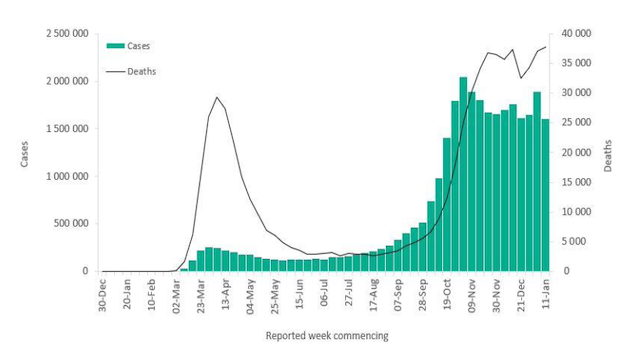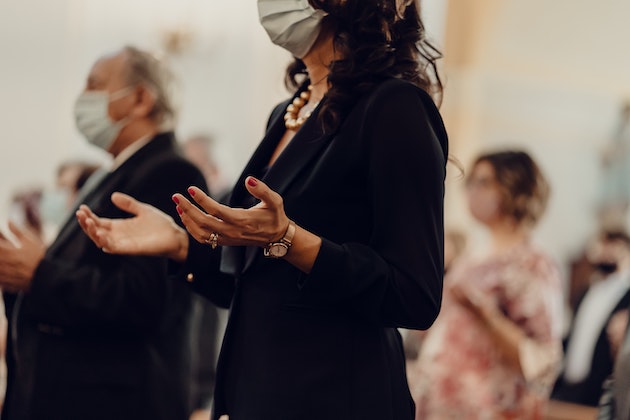Evangelical health workers and the ‘third wave’: “We depend on each other”
In the midst of the current coronavirus crisis, Spanish evangelical doctors encourage believers to “serve and show God's love in a visible way”.
Protestante Digital · MADRID · 22 JANUARY 2021 · 17:50 CET

The ‘third wave’ of coronavirus is a reality. The most pessimistic forecasts are coming true this winter in Europe, with infections soaring and the hospital admissions escalating.
Once again, health workers are facing this situation from the front line. Spanish news website Protestante Digital has talked to practising evangelical doctors, to know how they face their work and what we can do to tackle the pandemic.
Crisis
Health workers see the current situation as “bad”, “worrying” or “very serious”. Orlando Enriquez, a family doctor, warns that “the pandemic continues to advance and we are already facing an obvious ‘third wave’ that will have very harsh consequences”.
Simeon Eremiev, a medical resident at the Vall d'Hebron hospital in Barcelona, has been treating patients with coronavirus for months. “We are noticing an increase in cases, especially related to the Christmas holidays”.
“It is not only worrying that the new strains are so contagious that the number of cases rises sharply, or that the disease collapses emergency rooms and ICUs, tires healthcare staff and paralyses the economy... but it also takes vulnerable people who just a few days ago were celebrating the holidays with their families, with all the drama that entails”.
For Sara Ares, a family doctor working in a health centre in Madrid, “it is horrible because among all these people, some will require hospitalisation and will also die from a disease that is avoidable by taking appropriate safety measures”.
Another problem is that the increase in serious covid-19 cases reduces attention to other pathologies, so that “there will be a worse follow-up of those diseases that are already known”.
Raquel Barrantes, a specialist in anaesthesiology and secretary of the Spanish Evangelical Medical Union, says that we are “in the worst moment of the pandemic, both in terms of the number of cases and the accumulated effects at all levels: social, healthcare, economic, psychological”.

Evolution of the pandemic in Europe, according to official WHO figures. / WHO.
Political failure
In October, the Spanish government approved a new state of emergency to take restrictive measures to bend the infection curve. The aim was to bring the curve down to 25 cases per 100,000 inhabitants within fourteen days. The decree gave part of the responsibility of taking specific measures to the regional governments.
However, both the state and regional strategies do not seem to have been effective. Something similar has happened in other European countries such as Germany, the UK, Portugal, France and Italy. Why?
Among other problems, Barrantes mentions “the deficient foresight and planning of actions in a health system which lacks resources, especially human resources; or the communication with citizens in general, which requires clear information backed by experts and without political overtones”.
According to Eremiev, “from the scientific and academic sphere we know that strict confinement works to bend the curve. However, it is not an easy measure, since it mainly affects the economy and the lives of many people. The political leaders, with the help of experts, are the ones who have the task of proposing and implementing the measures”.
“The political idiosyncrasy of our country does not help, with a coalition government that has a divided leadership; with the politicisation of the measures; and with diffuse regional competencies in health, which makes it difficult to establish homogeneous and fair measures that are understandable to all citizens”.
Sara Ares recognises that this decision making is “difficult”, but “there has been a lack of courage to listen and do what professionals have been demanding from the beginning: hire trackers, strengthen primary care and public health to avoid having to take stricter measures”.
“Our politicians are measuring the possible effect of their decisions in terms of political benefit, so that they do not have a firm discourse. Whatever they do or say, will be used against them by their political opponents. That does not help”, stresses Enriquez.

Social responsibility
Beyond political decisions, group behaviour is one of the keys to halting the spread of the pandemic. How is civil society responding to this challenge?
Eremiev believes that it has become clear that “when measures are relaxed, cases increase”. Despite this, there are people who “minimise the problem or downplay the effectiveness of the measures, hiding behind misinterpreted individual cases, prejudices towards the system (denialists) or just their individual freedom”.
However, “this is not a problem of individual freedom, but of society as a whole. We are all part of this society and our actions have consequences on others”.
Ares stresses that it is essential to follow basic safety rules (hand washing, masks) “avoiding closed places and avoiding eating or drinking with anyone who is not a cohabitant. If I want to meet friends, in the park and at a distance. And secondly, getting vaccinated whenever possible”.
Enriquez recommends restricting social encounters “drastically and taking care of the capacity in closed spaces. It seems that the vaccines may provide a period of some safety in the coming months, although the duration of immunity is unclear, so it will be necessary to maintain precautionary measures for several months”.
For Raquel Barrantes, self-responsibility means understanding that “we depend on each other and no one should be above the stipulated rules”.
Christian witness
In the midst of such a complex and difficult situation, Christians have an opportunity to serve. “It is time to keep our eyes fixed on the Lord to fulfil his purpose where he has placed each one of us”, Barrantes points out.
“Many people are lonely, frightened, grieving, confused... Patients spend long hours in isolation day after day, alone. Today's technology makes it possible to minister to these people with messages and even prayer, despite the isolation”, she says.

In the UK, some Anglican churches - like the one pictured here - have opened their doors as vaccination centres. / Ash Mills Furthermore, “there is a huge range of opportunities to serve and show God's love in a visible way and probably also a multitude of people who don't know where to go with their physical and spiritual needs”.
Enriquez adds that we can engage in “constant prayer, both for the pandemic, for advances in research for treatments, and for our authorities, who do not have it easy”.
“We have an opportunity like no other to show the hope that there is in Christ's love and God's care in the midst of adversity”, Eremiev stresses.
“For those who are more reticent about governmental measures, in the first letter of Peter we are urged to submit to the authorities. I don't think it should be a blind submission, but it should be motivated by the same love that seeks the good of the neighbour”.
Ares asks for responsibility when using social media, where it is important to “educate yourself before sharing false information. If you are going to use your voice, share how to protect yourself against Covid-19 and encourage vaccination”.
She also considers it necessary to "be humble and not get carried away by our own prudence, we can be infected just like others”.
“It also is important to be grateful and kind when dealing with health workers and civil servants, they are not to blame for things not working well, many are exhausted and some have left their profession because they cannot cope with this situation”, she adds.
Finally, she encourages Christians not to complain: “Our country lives in a continuous complaint about almost any coronavirus measure. If as Christians we are always complaining, we have not understood that we are pilgrims and that in this world we will have affliction. Have we forgotten that God has the last word? Let us do something constructive. The next complaint that comes to your mind, pray: 'His kingdom come, thy will be done...'Act on what is in your power to act, and let us pray to resist the temptation to complain”.
“We can remind those around us that it is a good time to reflect on our own limitations and the need for the transcendent, life is fragile; this pandemic has made that clear, sharing the gospel of eternal life in Christ remains urgent and a priority”, concludes Enriquez.
Published in: Evangelical Focus - europe - Evangelical health workers and the ‘third wave’: “We depend on each other”
